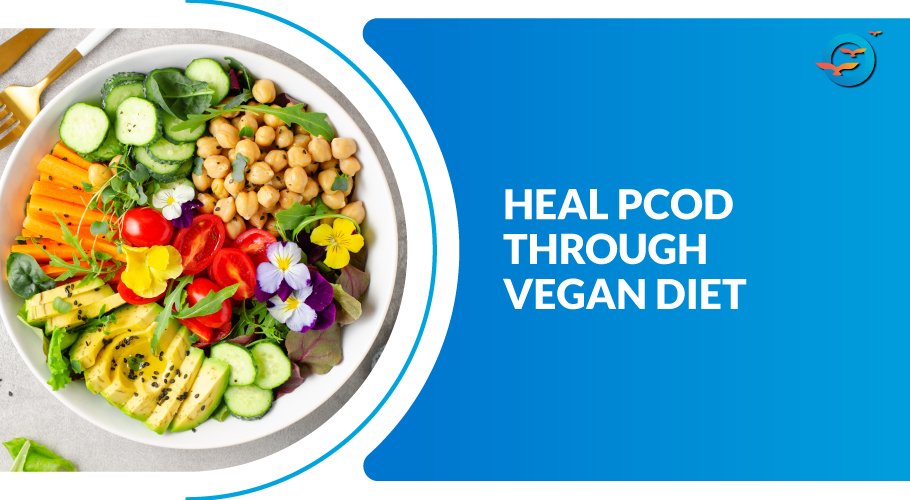
Healing PCOD Naturally with a Vegan Diet – A Simple and Sustainable Guide
Polycystic Ovary Disease (PCOD), also known as Polycystic Ovary Syndrome (PCOS), is one of the most common hormonal imbalances affecting women today. It can lead to several challenges such as irregular periods, acne, unwanted hair growth, weight gain, insulin resistance, and even difficulties with fertility. While medical treatments are available, many women today prefer to explore natural and long-term solutions to manage PCOD symptoms effectively.
One such powerful and sustainable approach is following a vegan diet based on whole, plant-based foods. This lifestyle change not only supports hormone balance but also helps in improving metabolism, managing weight, and restoring overall health.
Understanding Why PCOD Happens
PCOD develops when the ovaries produce excess male hormones (androgens), which disrupts ovulation and leads to multiple cysts in the ovaries. Poor lifestyle habits, stress, lack of physical activity, and high intake of processed foods can worsen these hormonal imbalances. The condition is also closely linked to insulin resistance, where the body struggles to use insulin effectively, leading to weight gain and irregular menstrual cycles.
This is why a diet that helps improve insulin sensitivity and reduces inflammation can make a significant difference—and that’s where a vegan diet comes in.
Why a Vegan Diet Can Be a Game-Changer for PCOD
A whole food plant-based vegan diet (WPBD) is rich in fiber, antioxidants, vitamins, and minerals that work together to support your hormonal and metabolic health. Let’s understand how it helps:
1. Improves Insulin Sensitivity
Insulin resistance is one of the main causes of PCOD. Plant-based diets naturally reduce insulin spikes because they are rich in fiber and low in refined carbohydrates. Foods like lentils, beans, and whole grains release sugar slowly into the bloodstream, helping maintain stable blood sugar levels.
2. Reduces Inflammation Naturally
Chronic inflammation contributes to hormonal imbalance and weight gain. A vegan diet, rich in colorful fruits, vegetables, seeds, and nuts, provides antioxidants that fight inflammation and oxidative stress, supporting smoother hormonal function.
3. Supports Healthy Weight Loss
Many women with PCOD struggle with weight management. Vegan diets are naturally lower in saturated fats and calories, while being high in fiber—helping you feel full longer and reducing unnecessary snacking. This makes it easier to achieve and maintain a healthy weight, which in turn helps restore ovulation and regular menstrual cycles.
4. Balances Hormones Naturally
Plant-based foods provide essential nutrients like magnesium, zinc, and omega-3s that support hormone regulation. Healthy fats from nuts, seeds, and avocados help in the production of balanced hormone levels, reducing symptoms such as acne and excess facial hair.
5. Enhances Gut Health
Gut health plays a vital role in maintaining hormonal balance. The high fiber content of a vegan diet supports better digestion and promotes healthy gut bacteria, which helps in the detoxification of excess hormones naturally.
How to Follow a PCOD-Friendly Vegan Diet
Transitioning to a vegan lifestyle doesn’t have to be complicated. Here’s how you can make it simple and effective:
1. Choose Whole, Unprocessed Foods
Focus on fresh fruits, vegetables, whole grains (like brown rice, quinoa, and millets), legumes, lentils, nuts, and seeds. These foods provide steady energy and nutrients without spiking your blood sugar.
2. Include Healthy Fats
Healthy fats are essential for hormone balance. Include avocados, flaxseeds, chia seeds, walnuts, and olive oil in your daily meals.
3. Opt for Complex Carbohydrates
Avoid refined carbs like white rice and maida-based foods. Instead, choose complex carbs like oats, sweet potatoes, and millets that release energy slowly and prevent insulin resistance.
4. Get Enough Protein
Protein is vital for muscle health and metabolism. Include sources like tofu, tempeh, lentils, chickpeas, and plant-based protein powders.
5. Supplement Wisely
Certain nutrients such as Vitamin B12, iron, and calcium may be lower in vegan diets. Include fortified foods like plant-based milk or take supplements if needed, after consulting your healthcare provider.
6. Stay Hydrated
Drinking enough water helps in maintaining healthy digestion, detoxification, and hormone regulation. Aim for at least 2–3 liters a day.
Can a Vegan Diet Alone Heal PCOD?
While a vegan diet provides an excellent foundation for healing PCOD naturally, it works best when combined with other healthy habits. Regular exercise, stress management, adequate sleep, and mindfulness also play key roles in restoring hormonal balance.
It’s important to remember that results take time. You may not see changes overnight, but with consistency and the right guidance from a qualified nutritionist or lifestyle expert, many women have experienced reduced symptoms, improved energy, and more regular menstrual cycles.
The Bottom Line
Healing PCOD naturally is possible when you take a holistic and patient approach. A vegan diet rich in whole, plant-based foods can help you manage symptoms, balance hormones, and improve your overall well-being—without depending entirely on medications.
Every woman’s body is unique, so it’s best to seek personalized advice from a healthcare or nutrition expert before making major dietary changes.
For a deeper understanding and practical tips on managing PCOD naturally through a vegan lifestyle, read more on our blog:

